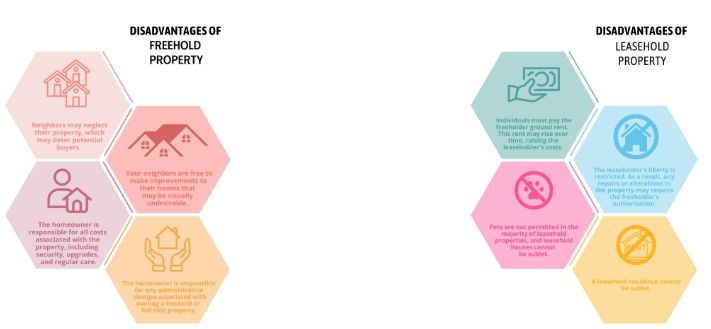Freehold Property vs Leasehold Property
Deal Acres
Last Update 2 years ago
A few terms that confuse most home purchasers are “freehold” and “leasehold”. All in all, their meaning could be a little more obvious. Are there any legal issues related to them that a home client ought to know about? What is the difference between them? and which one is better?
Contents
01. Introduction
02. Freehold Property
03. Leasehold Property
- What kind of properties can't be freehold?
- Would leasehold property be able to be changed over into freehold property?
- Documents needed for converting leasehold property to freehold
- What types of properties are liked by buyers?
- Advantages of freehold property and leasehold property
- Which type of property is best for residential or commercial purposes?
- Which is Beneficial - leasehold or freehold property?
04. FAQs
Introduction
The primary distinction between freehold and leasehold properties is related to land ownership and control. As an owner, you have a right to do whatever you wish for your home. On account of a leasehold property, the owner is given a government tenure of 99 years. It is possible to stretch out the leasehold to 999 years in the event that the ownership, which is the State in the majority of the cases, wishes to broaden the lease and you need to take care of the rent extension.
Freehold Property
On the off chance that you have bought a freehold property, you own the land it is based on and furthermore the house. On account of flats, the owner of the house turns into an investor in the property. You can live there however long you want. You will reserve the privilege to make adjustments in the house or re-try a few pieces of the house. You could need to take consent from specialists assuming you achieve primary changes, (particularly if there should arise an occurrence of old structures). In India, most houses are sold as freehold property yet flats are for the most part on rent.
However, this also is changing as numerous flats are getting sold as freehold.
Leasehold Property
In case if you have purchased a leasehold property, you reserve the privilege to set a time for a specified timeframe. Here, the buyer isn’t the proprietor of the property or the land it is arranged upon. In the event of a leasehold property, you should pay ground rent to the proprietor or the leaseholder. When the set time frame in the rent expires, the ownership of the property is given back to the landowner. A greater part of the rent is generally given for a time of 99 years. For those choosing leasehold properties, it is vital to know the residency of the rent as it will impact the worth of the property. It is possible to stretch out the leasehold to 999 years.
What kind of properties can't be freehold?
Apartments or Flats can never be freehold since they are residences built on similar land claimed by the builder/developer, where every flat owner is an investor.
Would leasehold property be able to be changed over into freehold property?
Yes, few states like Delhi permit you to change over a leasehold property into a freehold. Also, assuming that there is such an open door, you ought to choose it. Each state has an alternate arrangement of rules for such changes.
Documents needed for converting leasehold property to freehold
When applying for the conversion of the leased property to freehold property, the following documents must be needed.
- Copy of lease deed or sub-lease deed
- Copy of sale of agreement
- Copy of power of attorney
- Possession documentation such as property tax receipts
- Demand/allotment letter from the government
- No objection certificate, if needed (GPA)
What types of properties are liked by buyers?
Buyers maximum prefers freehold property rather than leasehold because the chance of capital growth is more in it. Freehold title gives the buyer full responsibility for the purchased property as against leasehold title. In leasehold title, the land has a place either with the designer or state authority.
Advantages of freehold property and leasehold property
Freehold Property
- The owner has 100% rights.
- The person owns the property forever or until it is sold.
- There are no restrictions.
Leasehold property
- Reduces Initial Costs
- Tax Deductibility
- Ownership Retention

Which type of property is best for residential or commercial purposes?
If you are considering investing in a residential property, knowing what a freehold property is may encourage you to do so. And you are correct. Freehold residential homes provide the buyer with greater control and ownership, as well as fewer hassles following purchase. The only difficulty may be that the initial investment will be considerable. You can, however, obtain bank financing for the same.
Most commercial players prefer leasehold assets since freehold assets can be quite expensive. Commercial players also want the ability to migrate from a site if they need to scale up or down after a certain period of time. As a result, leaseholds work better.
Which is Beneficial - leasehold or freehold property?
It is difficult to tell if one sort of ownership is superior to another. Each has its own set of merits and demerits.
However, in the following instances, freehold property would be a superior choice.
- Want to acquire a home as an investment?
- Want to buy a home for your family?
- In order to get the property, you must obtain a bank loan.
- You plan to rent or lease the property after a period of time.
- You propose to construct additional floors in the future.
Here are some situations where purchasing a leasehold property would be a better alternative.
- You are unsure about the legal aspects of the property and do not want to be involved in legal quarrels.
- You need a large plot of land with a facility to run your business.
- You want to live in the city center but cannot afford to buy the land and structure.
- You don’t want to deal with the overhead costs.
- You required the freedom to move from one location to another.

Conclusion
One major distinction between leasehold and freehold property is ownership; once the lease expires, the property reverts to the landlord or freeholder who provided the rights to use the property for consideration. In contrast, the freeholder owns the land for an indefinite period of time.
In the end, before capitalizing in freehold or leasehold property. it is suggested to look thoroughly at this article it will help you to choose which is suitable for you. As in the last, the decision will be yours and we hope you would take it right as it’s a matter of your hard-earned income.
Here you can also read about Residential vs commercial property.
FAQs
On the off chance that you have bought a freehold property, you own the land it is based on and furthermore the house. On account of flats, the owner of the house turns into an investor in the property. You can live there however long you want. You will reserve the privilege to make adjustments in the house or re-try a few pieces of the house. You could need to take consent from specialists assuming you achieve primary changes, (particularly if there should arise an occurrence of old structures). In India, most houses are sold as freehold property yet flats are for the most part on rent.
In case if you have purchased a leasehold property, you reserve the privilege to set a time for a specified timeframe. Here, the buyer isn’t the proprietor of the property or the land it is arranged upon. In the event of a leasehold property, you should pay ground rent to the proprietor or the leaseholder. When the set time frame in the rent expires, the ownership of the property is given back to the landowner. A greater part of the rent is generally given for a time of 99 years. For those choosing leasehold properties, it is vital to know the residency of the rent as it will impact the worth of the property. It is possible to stretch out the leasehold to 999 years.
What kind of properties can't be freehold?
Apartments or Flats can never be freehold since they are residences built on similar land claimed by the builder/developer, where every flat owner is an investor.
What are the Advantages of freehold property?
- The owner has 100% rights.
- The person owns the property forever or until it is sold.
- There are no restrictions on inviting guests, having pets, or renting out the property.
What are the Disadvantages of a freehold or full title property?
- Neighbors may neglect their property, which may deter potential buyers.
- Your neighbors are free to make improvements to their homes that may be visually undesirable.
- The homeowner is responsible for all costs associated with the property, including security, upgrades, and regular care.
- The homeowner is responsible for any administrative charges associated with owning a freehold or full-title property.
What are the Advantages of a Leasehold property?
- Reduces Initial Costs
- Tax Deductibility
- Ownership Retention
What are the Disadvantages of Leasehold Property?
- Individuals must pay the freeholder ground rent. This rent may rise over time, raising the leaseholder’s costs.
- The leaseholder’s liberty is restricted. As a result, any repairs or alterations to the property may require the freeholder’s authorization.
- Pets are not permitted in the majority of leasehold properties, and leasehold houses cannot be sublet.
- A leasehold residence cannot be sublet.

